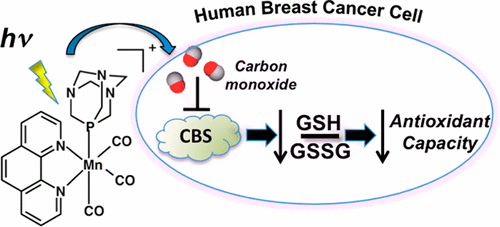当前位置:
X-MOL 学术
›
J. Med. Chem.
›
论文详情
Our official English website, www.x-mol.net, welcomes your
feedback! (Note: you will need to create a separate account there.)
Attenuation of Antioxidant Capacity in Human Breast Cancer Cells by Carbon Monoxide through Inhibition of Cystathionine β-Synthase Activity: Implications in Chemotherapeutic Drug Sensitivity
Journal of Medicinal Chemistry ( IF 6.8 ) Pub Date : 2017-09-20 00:00:00 , DOI: 10.1021/acs.jmedchem.7b00476 Brian Kawahara 1 , Travis Moller 2 , Kayla Hu-Moore 3 , Samantha Carrington 1 , Kym F. Faull 2 , Suvajit Sen 3 , Pradip K. Mascharak 1
Journal of Medicinal Chemistry ( IF 6.8 ) Pub Date : 2017-09-20 00:00:00 , DOI: 10.1021/acs.jmedchem.7b00476 Brian Kawahara 1 , Travis Moller 2 , Kayla Hu-Moore 3 , Samantha Carrington 1 , Kym F. Faull 2 , Suvajit Sen 3 , Pradip K. Mascharak 1
Affiliation

|
Drug resistance is a major impediment to effective treatment of breast cancer. Compared to normal cells, cancer cells have an increased antioxidant potential due to an increased ratio of reduced to oxidized glutathione (GSH/GSSG). This is known to confer therapeutic resistance. Here, we have identified a mechanism, unique to breast cancer cells, whereby cystathionine β-synthase (CBS) promotes elevated GSH/GSSG. Lentiviral silencing of CBS in human breast cancer cells attenuated GSH/GSSG, total GSH, nuclear factor erythroid 2-related factor 2 (Nrf2), and processes downstream of Nrf2 that promote GSH synthesis and regeneration of GSH from GSSG. Carbon monoxide (CO) reduced GSH/GSSG in three breast cancer cell lines by inhibiting CBS. Furthermore, CO sensitized breast cancer cells to doxorubicin. These results provide insight into mechanism(s) by which CBS increases the antioxidant potential and the ability for CO to inhibit CBS activity to alter redox homeostasis in breast cancer, increasing sensitivity to a chemotherapeutic.
中文翻译:

一氧化碳通过抑制胱硫醚β-合酶活性减弱人乳腺癌细胞的抗氧化能力:对化疗药物敏感性的影响。
耐药性是有效治疗乳腺癌的主要障碍。与正常细胞相比,由于还原型谷胱甘肽与氧化型谷胱甘肽(GSH / GSSG)的比例增加,癌细胞具有更高的抗氧化能力。已知这赋予治疗抵抗力。在这里,我们已经确定了乳腺癌细胞特有的机制,其中胱硫醚β-合酶(CBS)可以促进GSH / GSSG升高。人乳腺癌细胞中CBS的慢病毒沉默减弱了GSH / GSSG,总GSH,核因子红系2相关因子2(Nrf2),以及Nrf2下游的过程,促进了GSH的合成和GSH从GSSG的再生。一氧化碳(CO)通过抑制CBS降低了三种乳腺癌细胞系中的GSH / GSSG。此外,CO使乳腺癌细胞对阿霉素敏感。
更新日期:2017-09-20
中文翻译:

一氧化碳通过抑制胱硫醚β-合酶活性减弱人乳腺癌细胞的抗氧化能力:对化疗药物敏感性的影响。
耐药性是有效治疗乳腺癌的主要障碍。与正常细胞相比,由于还原型谷胱甘肽与氧化型谷胱甘肽(GSH / GSSG)的比例增加,癌细胞具有更高的抗氧化能力。已知这赋予治疗抵抗力。在这里,我们已经确定了乳腺癌细胞特有的机制,其中胱硫醚β-合酶(CBS)可以促进GSH / GSSG升高。人乳腺癌细胞中CBS的慢病毒沉默减弱了GSH / GSSG,总GSH,核因子红系2相关因子2(Nrf2),以及Nrf2下游的过程,促进了GSH的合成和GSH从GSSG的再生。一氧化碳(CO)通过抑制CBS降低了三种乳腺癌细胞系中的GSH / GSSG。此外,CO使乳腺癌细胞对阿霉素敏感。











































 京公网安备 11010802027423号
京公网安备 11010802027423号